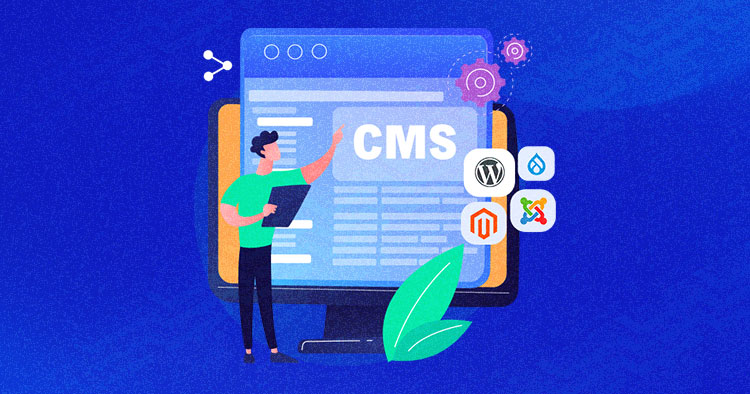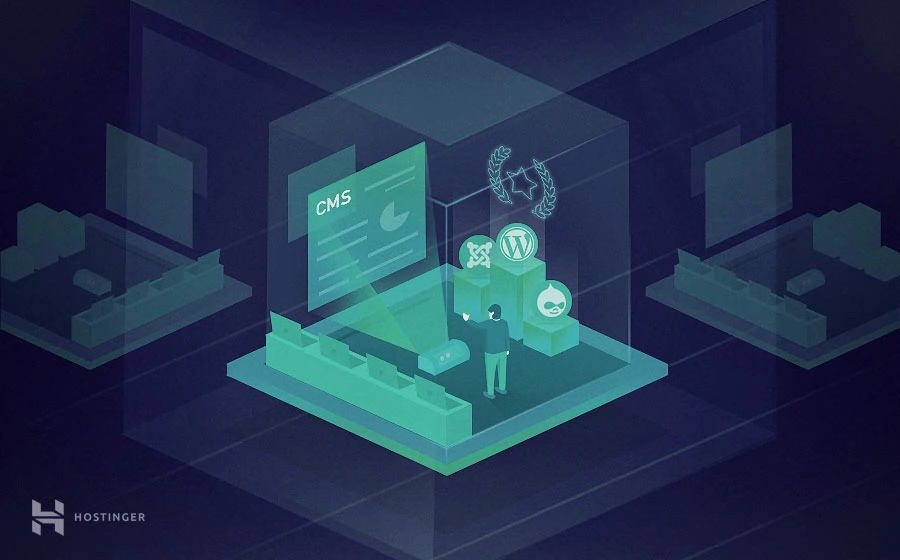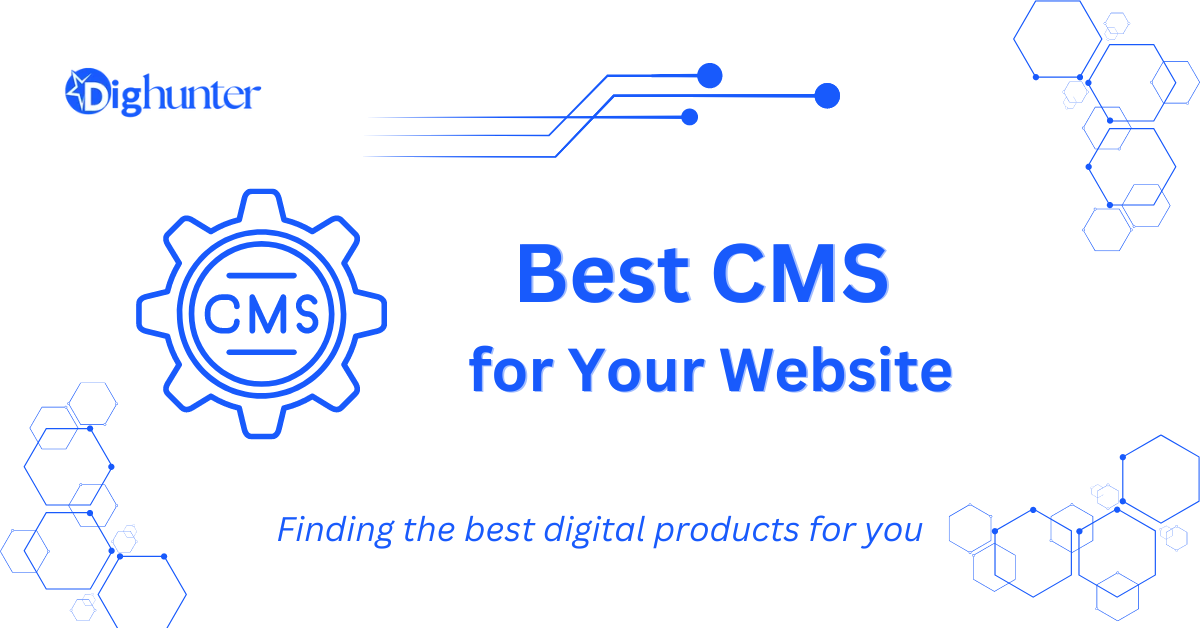Top CMS platforms to start a website include WordPress, Wix, and Joomla. These platforms offer user-friendly interfaces and robust features.
Choosing the right Content Management System (CMS) is crucial for your website’s success. WordPress is the most popular choice, known for its flexibility and extensive plugin library. Wix offers an intuitive drag-and-drop builder, making it ideal for beginners. Joomla provides a balance between ease of use and advanced features, suitable for more experienced users.
Each platform caters to different needs, whether you’re building a blog, an e-commerce site, or a portfolio. Understanding your requirements will help you select the best CMS for your project. Ultimately, these platforms empower you to create, manage, and maintain a professional-looking website with minimal technical knowledge.

Credit: www.cloudways.com
➡️ Top CMS Platforms
Choosing the right CMS platform is crucial for your website’s success. The best CMS platforms offer ease of use, flexibility, and a range of features. This guide will help you navigate through the top CMS platforms to start a website. We’ll explore popular choices and emerging options that can cater to different needs and preferences.
Popular Choices
Several CMS platforms have stood the test of time and remain popular due to their robust features and user-friendly interfaces. Here are some of the most popular choices:
- WordPress: The most popular CMS, powering over 40% of all websites. It offers a vast range of themes, plugins, and customization options.
- Joomla: Known for its flexibility and extensive community support. Ideal for both beginners and advanced users.
- Drupal: Highly customizable and powerful, making it suitable for complex websites. It requires a bit more technical knowledge.
- Squarespace: User-friendly with beautiful templates, perfect for those who want to set up a website quickly and easily.
Here’s a quick comparison table to highlight some key features:
| CMS | Ease of Use | Customization | Support |
|---|---|---|---|
| WordPress | Very Easy | High | Large Community |
| Joomla | Moderate | High | Good Community |
| Drupal | Complex | Very High | Extensive Community |
| Squarespace | Very Easy | Moderate | Dedicated Support |
Emerging Options
New CMS platforms are constantly emerging, offering innovative features and catering to niche markets. Here are some of the latest options gaining popularity:
- Webflow: A visual CMS that allows designers to build responsive websites without coding. It offers a unique blend of design freedom and powerful CMS capabilities.
- Ghost: A minimalist platform focused on blogging. It is fast, secure, and offers a distraction-free writing experience.
- Strapi: An open-source headless CMS designed for developers. It provides full control over content management and API customization.
- Contentful: Another headless CMS that focuses on delivering content across multiple channels. It is ideal for complex content needs and offers extensive integration options.
Here’s a quick comparison table for these emerging options:
| CMS | Unique Feature | Target Audience | Support |
|---|---|---|---|
| Webflow | Visual Design | Designers | Good Community |
| Ghost | Blogging | Writers | Dedicated Support |
| Strapi | Headless CMS | Developers | Extensive Community |
| Contentful | Multi-channel Content | Large Enterprises | Dedicated Support |
➡️ WordPress Insights
Choosing the right CMS platform is crucial for building a successful website. Among the many options, WordPress stands out as a popular choice for beginners and experts alike. Let’s dive into some WordPress insights to understand why it is so highly regarded.
Features And Benefits
WordPress offers a plethora of features and benefits that make it a top choice for website creation. Here are some key highlights:
- Ease of Use: WordPress is known for its user-friendly interface. Even beginners can quickly learn to manage their websites.
- SEO Friendly: WordPress is optimized for search engines, which helps your website rank higher in search results.
- Large Community: With a large global community, you can easily find support, tutorials, and plugins to enhance your website.
- Flexibility: WordPress supports various types of websites, from blogs to e-commerce stores.
- Security: Regular updates and a robust security system keep your website safe from threats.
Below is a table summarizing the key features and benefits of WordPress:
| Feature | Benefit |
|---|---|
| Ease of Use | Quick learning curve for beginners |
| SEO Friendly | Higher search engine rankings |
| Large Community | Extensive support and resources |
| Flexibility | Supports various website types |
| Security | Regular updates and robust system |
Customization Options
One of the standout features of WordPress is its extensive customization options. Here are a few ways you can tailor your WordPress site to meet your needs:
- Themes: WordPress offers thousands of free and premium themes. These themes allow you to change the look and feel of your website with just a few clicks.
- Plugins: With over 50,000 plugins available, you can add almost any functionality to your website. This includes SEO tools, contact forms, and social media integrations.
- Widgets: Widgets make it easy to add content and features to your sidebars and footers. They provide a drag-and-drop interface for simplicity.
- Custom Code: For advanced users, WordPress allows for custom coding. You can add HTML, CSS, and JavaScript to further customize your site.
Below is a table summarizing the customization options in WordPress:
| Customization Option | Purpose |
|---|---|
| Themes | Change website appearance |
| Plugins | Add functionalities |
| Widgets | Add content to sidebars and footers |
| Custom Code | Advanced customization |
With such extensive features and customization options, it’s no wonder WordPress is a leading CMS platform for website creation.
➡️ Wix Advantages
Choosing the right CMS platform is crucial for building a successful website. Wix stands out as one of the best CMS platforms due to its many advantages. Let’s dive into the Wix advantages that make it a top choice for many users.
User-friendly Interface
Wix is renowned for its user-friendly interface. Beginners can easily navigate the platform without any technical knowledge. Here are some features that enhance its user experience:
- Drag-and-Drop Editor: Users can simply drag elements like text, images, and videos into place.
- Intuitive Dashboard: The dashboard is straightforward, with clear labels and easy-to-find settings.
- Pre-made Templates: Wix offers a variety of templates that users can customize to fit their needs.
Wix also provides a comprehensive help center with tutorials and guides. Users can quickly find solutions to any challenges they encounter. Additionally, the platform’s onboarding process is smooth, guiding new users through the initial setup.
| Feature | Benefit |
|---|---|
| Drag-and-Drop Editor | Easy customization without coding |
| Intuitive Dashboard | Simple navigation |
| Pre-made Templates | Quick start with professional designs |
Design Flexibility
Wix offers unparalleled design flexibility. Users can create unique websites that stand out. The platform provides several tools to enhance the design process:
- Customizable Templates: Every template is fully customizable, allowing users to change colors, fonts, and layouts.
- Advanced Design Features: Wix includes features like video backgrounds, animation, and scroll effects.
- Mobile Optimization: All designs are mobile-friendly, ensuring a seamless experience on any device.
With Wix, users can also access a vast library of professional images and graphics. These resources help create visually stunning websites without needing a designer. The platform’s Wix ADI (Artificial Design Intelligence) tool can even build a personalized website based on user preferences.
For those with coding skills, Wix Code allows for further customization with HTML, CSS, and JavaScript. This feature ensures that even advanced users can achieve their desired design.
In summary, Wix combines ease of use with powerful design capabilities, making it a top choice for any website project.
➡️ Shopify for E-commerce
Choosing the right CMS platform is crucial to start a website. Shopify for E-Commerce stands out as a top choice. It offers a user-friendly interface and robust features to help you build your online store quickly. With Shopify, even those with little technical know-how can set up and manage their e-commerce site efficiently.
Selling Online
Selling online with Shopify is seamless and straightforward. The platform is designed to cater to both small and large businesses. With Shopify, you can easily add products, manage inventory, and track sales.
- Product Management: Add unlimited products, organize them by category, and include detailed descriptions.
- Inventory Tracking: Keep track of your stock levels in real-time and receive notifications when inventory is low.
- Order Management: Process orders efficiently with integrated tools for order tracking and fulfillment.
- Sales Channels: Sell on multiple platforms, including social media, Amazon, and eBay, all from one dashboard.
Shopify’s dashboard is user-friendly, making it easy to manage your store. The platform also offers a variety of themes that are mobile-responsive and customizable. This ensures your online store looks professional and appealing on any device.
| Feature | Description |
|---|---|
| Product Management | Add and organize products with ease |
| Inventory Tracking | Real-time stock level updates |
| Order Management | Efficient order processing tools |
| Sales Channels | Sell across multiple platforms |
Payment Integrations
Payment integrations are a critical aspect of any e-commerce platform. Shopify excels in this area by offering a wide range of payment options to suit your needs. With Shopify, you can integrate with over 100 payment gateways worldwide.
- Shopify Payments: This built-in payment solution allows you to accept credit cards directly on your store.
- Third-Party Gateways: Integrate with popular gateways like PayPal, Stripe, and Authorize.net.
- Multi-Currency Support: Accept payments in multiple currencies, making it easier to sell internationally.
- Fraud Prevention: Shopify offers robust fraud detection tools to protect your business from fraudulent transactions.
Setting up payment integrations on Shopify is simple. The platform provides clear instructions and support to help you get started. Whether you choose Shopify Payments or a third-party gateway, the process is seamless and secure.
| Payment Option | Benefits |
|---|---|
| Shopify Payments | Direct credit card acceptance, lower transaction fees |
| Third-Party Gateways | Flexibility to use popular payment providers |
| Multi-Currency Support | Accept payments from customers worldwide |
| Fraud Prevention | Advanced tools to detect and prevent fraud |
➡️ Joomla Essentials
Creating a website has never been easier, thanks to the abundance of CMS platforms available today. One of the most powerful and versatile options is Joomla. This platform offers a range of features that cater to both beginners and advanced users. Let’s delve into the essentials of Joomla and discover why it stands out.
Community And Support
Joomla boasts a vibrant and active community. This is vital for any CMS platform as it ensures continuous improvement and support. The Joomla community comprises developers, designers, and enthusiasts from around the world.
Some of the key benefits of the Joomla community include:
- Extensive Documentation: Joomla offers comprehensive guides and tutorials. These resources help users navigate the platform with ease.
- Forums and Discussion Boards: Users can participate in forums to seek advice. The community is always ready to help with any issues.
- Local User Groups: Joomla has local groups where users can meet and share knowledge. This fosters a sense of belonging and collaboration.
Moreover, Joomla provides professional support options. Users can opt for paid services if they need advanced assistance. This includes:
| Support Type | Description |
|---|---|
| Joomla! Official Support | Direct assistance from Joomla experts. |
| Third-Party Support | Help from certified Joomla developers and agencies. |
Extensions And Plugins
Joomla offers a vast array of extensions and plugins. These tools enhance the functionality of your website. With over 8,000 extensions available, users can easily find tools to meet their needs.
Some popular categories of Joomla extensions include:
- Content Management: Tools to manage articles, blogs, and multimedia content.
- SEO: Extensions to improve your website’s search engine rankings.
- Security: Plugins to protect your website from threats and vulnerabilities.
- E-Commerce: Solutions to create and manage online stores.
Joomla extensions are easy to install and configure. Users can find extensions through the Joomla Extensions Directory (JED). Each extension comes with user reviews and ratings, helping users make informed choices.
Additionally, many extensions offer customization options. This allows users to tailor their website to their specific needs. With Joomla, the possibilities are endless.

Credit: www.hostinger.com
➡️ Squarespace Strengths
Starting a website can be exciting but choosing the right CMS platform is crucial. Squarespace is known for its strengths, making it a popular choice among beginners and professionals alike. Let’s dive into some key strengths of Squarespace.
Visual Appeal
Squarespace excels in visual appeal. The platform offers a wide array of professionally designed templates. These templates are not only beautiful but also responsive, ensuring your site looks great on any device.
Key features of Squarespace’s visual appeal include:
- High-Quality Templates: Choose from hundreds of stunning templates designed by professionals.
- Customization Options: Easily customize colors, fonts, and layouts to match your brand.
- Responsive Design: Templates adapt to different screen sizes, making your site mobile-friendly.
This attention to detail makes Squarespace a favorite for artists, photographers, and anyone wanting a visually appealing website without much hassle.
Here’s a quick table to showcase some popular templates:
| Template Name | Best For |
|---|---|
| Brine | Online Stores |
| Forte | Portfolios |
| Bedford | Blogs |
Built-in Features
Squarespace comes with a wealth of built-in features that make website management easy. You don’t need to install additional plugins to get essential functionalities.
Some notable built-in features include:
- SEO Tools: Built-in SEO tools help improve your site’s visibility on search engines.
- Analytics: Get detailed insights into your site’s performance with built-in analytics.
- Blogging Platform: Easily create and manage blog posts with Squarespace’s intuitive blogging tools.
- E-commerce: Set up an online store with features like inventory management, payment processing, and more.
- SSL Security: All Squarespace websites come with free SSL certificates for added security.
These built-in features save you time and effort, allowing you to focus on creating content and growing your audience. Squarespace makes it easy for anyone to manage their website without needing extensive technical knowledge.
If you want a platform that combines visual appeal with robust built-in features, Squarespace is a strong contender.
➡️Drupal Power
Starting a website can be a daunting task, but choosing the right Content Management System (CMS) can make all the difference. One of the most powerful CMS platforms available is Drupal. Known for its flexibility and robust features, Drupal stands out in the crowded CMS market. Let’s dive into the specifics of why Drupal Power can be your best choice.
Security Features
One of the strongest points of Drupal is its security features. Drupal offers a range of security measures that protect your website from various threats.
- Regular Security Updates: Drupal’s dedicated security team frequently releases updates to patch vulnerabilities.
- Granular User Permissions: You can control who accesses what on your site, ensuring sensitive information stays protected.
- Strong Password Policies: Enforce strong passwords to enhance your site’s security.
- Community Support: A large community of developers continuously tests and improves security measures.
Here’s a quick table summarizing Drupal’s security features:
| Feature | Description |
|---|---|
| Regular Security Updates | Frequent patches to fix vulnerabilities |
| Granular User Permissions | Control user access levels |
| Strong Password Policies | Enforce complex passwords |
| Community Support | Continuous testing by developers |
These features make Drupal a top choice for any website that prioritizes security.
Scalability
Another reason to consider Drupal is its scalability. Drupal can handle websites of all sizes, from small blogs to large enterprise sites.
Here are some key points that highlight Drupal’s scalability:
- Modular Architecture: Add or remove features with ease, adapting as your site grows.
- Performance Optimization: Built-in caching and performance optimization tools ensure your site runs smoothly.
- Third-Party Integration: Easily integrate with other platforms and services, expanding your site’s capabilities.
- Multisite Management: Manage multiple websites from a single Drupal installation, saving time and resources.
To sum up, here is a table showcasing Drupal’s scalability features:
| Feature | Description |
|---|---|
| Modular Architecture | Add/remove features as needed |
| Performance Optimization | Caching and other tools for smooth operation |
| Third-Party Integration | Connect with other platforms |
| Multisite Management | Manage multiple sites efficiently |
Drupal’s scalability ensures that your website can grow and evolve without limitations.
➡️ Choosing The Right Cms
Starting a website can be exciting. Choosing the right CMS (Content Management System) is crucial. The best CMS platforms provide flexibility, functionality, and ease of use. But how do you choose the right one? You need to consider several factors, including budget, technical skills, and your specific needs.
Budget Considerations
Your budget plays a significant role in selecting a CMS. Some platforms are free, while others have a subscription fee. Free platforms like WordPress.org and Joomla can be budget-friendly. They offer many features and plugins without extra cost. Paid platforms like Squarespace and Wix charge a monthly or yearly fee.
Here’s a quick comparison:
| CMS Platform | Cost | Features |
|---|---|---|
| WordPress.org | Free (Hosting fees apply) | Highly customizable, many plugins |
| Squarespace | $12-$40/month | Beautiful templates, easy to use |
| Wix | $14-$39/month | Drag-and-drop builder, great support |
| Joomla | Free (Hosting fees apply) | Flexible, many extensions |
- Initial setup costs: Some CMS platforms require purchasing a domain and hosting.
- Ongoing expenses: Keep in mind subscription fees and premium plugins.
- Scalability: Ensure the CMS can grow with your business.
Technical Skills Required
The technical skills needed vary by CMS. Some platforms are beginner-friendly, while others require more expertise. WordPress.org is user-friendly but may need some coding knowledge. Squarespace and Wix are great for beginners with their drag-and-drop interfaces. Joomla is more complex and suits those with technical skills.
Here’s a skill-level comparison:
| CMS Platform | Skill Level | Learning Curve |
|---|---|---|
| WordPress.org | Intermediate | Moderate |
| Squarespace | Beginner | Easy |
| Wix | Beginner | Very Easy |
| Joomla | Advanced | Steep |
- Ease of use: Choose a CMS that matches your skill level.
- Support and tutorials: Some platforms offer extensive guides and community support.
- Customization: More advanced CMS platforms offer greater flexibility but need more skills.
Choosing the right CMS affects your site’s success. Consider your budget and technical skills before making a decision.

Credit: dokan.co
➡️ Frequently Asked Questions
- What Are The Best Cms Platforms?
The best CMS platforms include WordPress, Joomla, and Drupal. Each offers unique features. They cater to different needs. WordPress is user-friendly. Joomla is flexible. Drupal is powerful and secure.
- Why Choose WordPress For Your Website?
WordPress is popular for its ease of use. It offers a wide range of plugins. It’s highly customizable. Many themes are available. It’s SEO-friendly and has strong community support.
- How Does Joomla Compare To WordPress?
Joomla offers more flexibility than WordPress. It has advanced user management options. It’s ideal for complex sites. However, it’s less user-friendly. It requires more technical skills.
- Is Drupal Suitable For Beginners?
Drupal is less beginner-friendly. It requires technical skills. It’s powerful and secure. Ideal for developers. It offers extensive customization options. Great for complex and large-scale websites.
➡️ Final Thought
Choosing the right CMS platform is crucial for your website’s success. Each option offers unique features and benefits. Consider your specific needs and budget. With the right choice, you’ll have a solid foundation to build, manage, and grow your online presence effectively.
Explore these CMS platforms and start your website journey today.




